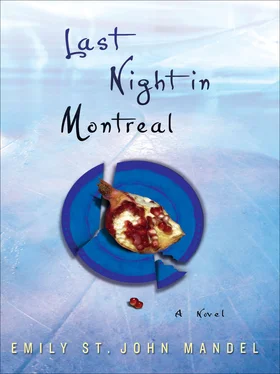Eli left her there. In the kitchen he found the pomegranate he’d bought for her and quartered it quickly on a pale blue plate. He thought the contrast between the shades of the pomegranate and the blue might please her. Any one of a number of details can prevent a ship from sinking. He carried the plate back to the bedroom and set it on the bedside table to grope for the flashlight under the bed. He took off his shoes, his belt, his jeans, left them in a heap on the floor, held the flashlight between his teeth and climbed under the duvet like a man entering a cave. He reached out for the blue plate and then turned to her, and her face was illuminated in the dimness.
“Don’t leave me,” he whispered. “Stay, I’ll buy you pomegranates. I won’t throw any more of your books out the window, I promise.”
She smiled faintly, still in tears.
“Here,” he said, “hold the flashlight.”
She sat up and took it from him, the duvet a tent between their heads. He sat cross-legged with the plate on his lap and tore the pomegranate apart, juice running down his hands and wrecking the sheets. He began to feed her pomegranate beads, two or three at a time, and she stopped weeping long before her lips were stained red.
Lilia left her mother’s house a little after midnight. Her half-brother Simon was the first one downstairs in the morning; he woke up shivering just before dawn. A cold breeze filled the house; the front door, closed imperfectly, had blown open after she’d left, and also a kitchen window was broken. A glass of water was frozen solid on his bedside table.
He climbed out of bed and pulled his quilt over his shoulders like a cloak. It trailed heavily behind him down the stairs, gathering dust. The linoleum of the kitchen floor felt like ice on his bare feet; he almost immediately lost feeling in his toes. The kitchen door was wide open, and snow had drifted over the threshold. At that hour the air outside was suffused with the greyish light that comes over northern landscapes just before the sun rises, when everything seems tired and somewhat unreal. He stood just inside the door, clutching the quilt around his shoulders and staring out at the lawn, and even though the scene outside was exactly what he’d been expecting, he found at that moment that he needed his mother, and also that he couldn’t speak. He reached outside, around the doorframe, and began ringing the doorbell over and over again.
She was by his side almost instantly and then running back up the stairs. He stood still in the doorway, listening to her footsteps in the upstairs hall, the sound she made when she saw that Lilia’s bedroom was empty, her footsteps coming back down the stairs. She was on the phone a moment later, although it took the dispatcher at the police station a few minutes to understand what she was saying. She called the more recent of her two ex-husbands and screamed obscenities into his answering machine until the machine cut her off. She hung up, shaking, and stared at her son. Her face was white. He met her gaze and looked quickly away. He was briefly interested to notice that he could see his breath inside the house.
“She dropped her bunny,” he said. His voice was stunned. “And there’s still glass in the snow.”
The kitchen window had been broken the night before, and glass was still shining on the snow outside. She stared at the shattered window for a moment.
“Help me,” she whispered. “Put your shoes on. Bring me the broom.” He pulled his boots on over his pajamas and let the quilt fall on the kitchen floor, and they worked together for a while in feverish silence, scooping and sweeping the broken glass out of the snow, collecting it into a shoebox from the hall closet. When they were done the cuffs of his pajamas were cold and soaking wet against his wrists. In the kitchen doorway she turned to him suddenly — he flinched and raised an arm reflexively to protect his face — but she only placed the box of broken glass and snow in his arms. The cardboard was soggy.
“Hide this,” she said, in a tone of voice that he knew not to question, “and bring me a ball.”
“What ball?” He was too dazed to cry.
“Any kind of ball, Simon. Wait. .”
She went to the cupboard and took out three bottles of Scotch, one almost empty. She laid these carefully on top of the snow and broken glass, and said, “Quickly, quickly.”
He took the box to the woodshed and put it under an upside-down moldering armchair. There was an old basketball on the woodshed floor, half deflated. When he brought it to her she was taping cardboard over the window, standing on the kitchen chair that had been Lilia’s only last night, weeping, talking to herself, taping fast. He went upstairs and dressed quietly, with a feeling of tremendous formality; he put on the pants he wore only on special occasions, a sweater that smelled of dust, and his good shoes. He combed his hair without being told to, although he wasn’t tall enough to see his whole head in the mirror. A short time later the police were there; they filled the kitchen with blue uniforms and tracked dirty snow into the house and fanned out to photograph what was there on the lawn. Not the lawn under the window, which had clearly been broken a day or two before; Simon, the mother explained through tears and hysterics, had been throwing a basketball in the house. The basketball was lying half buried in snow. She told them that she’d long since cleaned up the glass, that someone was coming to replace the window. They nodded, uninterested. They were photographing a spot beyond that, farther out toward the driveway and slightly to the right. It’s the perfect photograph: a child’s bare footprints emerge from the house, clearly visible in the snow, and meet after a few steps with the prints of a man’s winter boots. This is the point where the blue knitted bunny lies whitened by frost, and here there’s a scuff in the snow where she was swept off her feet. The bootprints turn here and recede into the forest and eventually coincide, some distance outside the frame of the photograph, with the tire marks down by the road.
The bunny was briefly famous, in a localized way; a couple of regional newspapers showed pictures of it staring up at the sky. Simon was the one who retrieved it that afternoon, when the photographers were done taking pictures. He put it in the bathtub for a while and sat on the bathtub’s edge to watch the pool of bluish water oozing out around it, then put it through the dryer. He sat in front of the dryer on an upturned milk crate, watching it spinning around and around. It came out hot but still wet, so he put it back in the dryer and watched it blurring around again until he got dizzy and had to look away. His mother was sobbing and sobbing in the kitchen, talking about Lilia and Lilia’s father and how she always just knew he was going to do something like this and that was why she had gotten the restraining order in the first place, and there were police officers everywhere. Some wanted to speak to him. He answered questions in a polite monotone, lying mostly, and when they were finished with him he took the bunny upstairs to his room and set it up on a folded towel on the corner of the bed. It still wasn’t completely dry, but he didn’t want to be downstairs anymore.
His mother came to him in the evening, when almost everyone had gone. There was a social worker in the kitchen and someone from the police station rigging something to the telephone, and there was a car down by the road with two police officers in it. She sat on the edge of his bed and stared tearfully at him. He wouldn’t meet her eyes.
“Thank you for helping me with the glass,” she said.
IN A MOTEL ROOM three hundred miles to the south, Lilia’s father was cutting off her hair. In the very beginning her arms had gauze bandages on them, for reasons that were almost immediately unclear; she sat on a chair in the bathroom and watched dark curls falling past her face and landing on the bandages, on the floor, on her legs, while her father moved around her with the scissors.
Читать дальше












